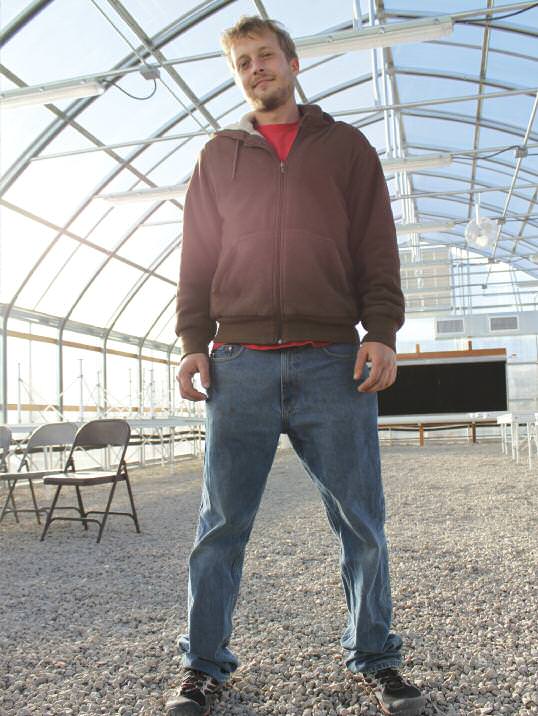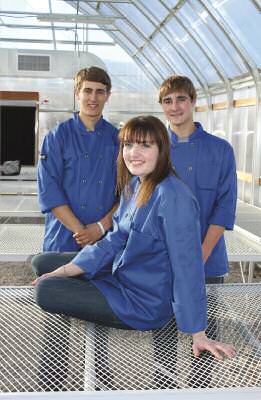GROWING GREEN
A Carson City project will feed the hungry and teach the children.
WRITTEN BY AMY HARRIS
PHOTOS BY JACI GOODMAN
Karen Abowd has many jobs. Among them are Carson City supervisor, restaurant owner, and flower basket project initiator. But it was her job as a leader of a youth group class at her local church that inspired her latest project: a greenhouse at Carson City High School.
Ray Saliga, greenhouse manager, will run programs and teach and
coordinate student activities in the greenhouse.
“A high school girl in my class had a really hard life,” Abowd says. “She talked about her father in prison and her mother who was deported. She stole formula to feed her brother and she was basically starving. I thought, This just can’t be.”
This experience served as the inspiration that sparked Abowd’s determination to get a greenhouse built at Carson City High. She believes that if students had access to fresh food they grew themselves there would be no reason for them to go hungry.
“Now, with a greenhouse, the students can grow food,” Abowd says. “They own it.”
Sustainable Movement
|
|
A trip to Turkey also inspired Abowd and her husband, Charlie. They were blown away by the country’s self-sufficiency and how this translated into less of an economic downturn for the country because people grew so much of what they needed. The greenhouse is meant to serve as a building block toward greater self-sufficiency in the Carson City area.
The project started in 2008, and finally opened its doors to a fully functioning, off-the-grid greenhouse on Dec. 16, 2011. Abowd and Ray Saliga, the AmeriCorps staff member in charge of planting and running the greenhouse, believe the greenhouse fits into the movement of youths pursuing environmentalism through agriculture.
“There’s this new wave of college kids rejecting careers in law and medicine,” Abowd says. “They want to get back into agriculture because they feel it’s the most they can do for the environment. They feel we are connected by food, and can do more by connecting to the earth.”
Community Support
The greenhouse not only intends to connect students and volunteers to the earth and the food they grow, but also has already extended its reach, incorporating the community. Funding the project was no easy feat. An off-the-grid greenhouse costs hundreds of thousands of dollars to build and operate (about $300,000 to build and about $200,000 for future add-ons). Grants, private donations, fundraisers, volunteers, and many other forms of community support funded the project. Local farmers consulted with Saliga and Abowd, and a contractor even built the greenhouse for free.
“The greenhouse is modeled after what Alice Waters did with her edible schoolyards and outdoor gardens,” Abowd says. “But this is Nevada where the growing season is tough, so we really had no model. There is no footprint for this greenhouse, and the contractor donated all of his time. It’s just amazing.”
The greenhouse project will donate 90 percent of its produce to local food banks, while the other 10 percent will go to Carson City High School’s award-winning culinary program. Plant and agricultural science students and students with disabilities will staff the greenhouse in addition to any volunteers who want to be part of the project.
Successful Launch
After years of theoretical planning, fundraising, and discussion, Saliga can’t wait to start planting and working with the students. In the empty greenhouse he indicates where peppers, cucumbers, lettuce, tomatoes, and herbs will line tables and where he will fill vertical space with trellises. The culinary students also look forward to using herbs and other greens grown at their own school.
“Fresh herbs and good tomatoes are really hard to get during the winter,” says Leah Kniffen, a 17-year-old culinary student. “It’s so nice to grow our own food. It’s definitely more hands on and allows us to be more local.”
For details about the greenhouse, visit www.Carsoncitygreenhouse.org.
Amy Harris is a UNR student and a writer. She has spent some time working in the greenhouses at Sierra Valley Farms and can’t wait to see the Carson City greenhouse come alive with fresh food.



